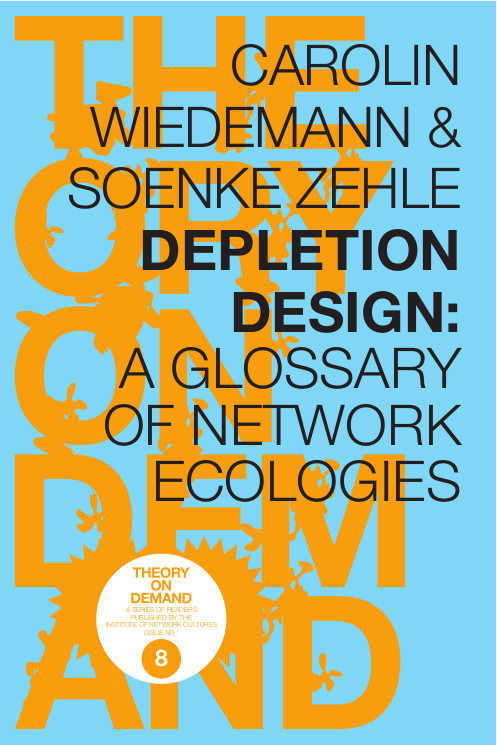Tobias Conradi, Heike Derwanz, Florian Muhle (eds.): Strukturentstehung durch Verflechtung: Akteur-Netzwerk-Theorie(n) und Automatismen (2011) [German]
Filed under book | Tags: · actor-network theory, culture, technology, theory

“Die Akteur-Netzwerk-Theorie stellt mit ihrem Anliegen, die Verflechtungen zwischen Natur, Kultur, Gesellschaft und Technik strikt empirisch zu erforschen, eine Herausforderung für die Sozial- und Kulturwissenschaften dar. Dieser Herausforderung widmet sich der Band aus einer interdisziplinären Perspektive. Ein Hauptinteresse gilt der Frage, wie mit der Akteur-Netzwerk-Theorie die Entstehung ungeplanter Strukturen untersucht werden kann.
Nach einem einleitenden Text von John Law wird eine kritische Diskussion über die überraschende Handlungsfähigkeit nicht-menschlicher Akteure, die Verteilung von Macht in Netzwerken sowie mögliche Akzentverschiebungen und theoretische Anschlüsse an die ANT entfaltet. Die Beiträge gehen dabei der Handlungsmächtigkeit von Viren, Problemen des Regierens nach Hurrikan Katrina oder der Frage einer nicht-modernen Geschichte moderner Medien nach.”
Publisher Wilhelm Fink, Munich, 2011
ISBN 3770552202, 9783770552207
341 pages
Carolin Wiedemann, Soenke Zehle (eds.): Depletion Design: A Glossary of Network Ecologies (2012)
Filed under book | Tags: · algorithm, anonymous, architecture, biopolitics, commons, creative industries, cyborg, design, ecology, hackerspace, media ecology, network ecology, networks, politics, remix, software, spam, technology, theory

“Depletion Design suggests that ideas of exhaustion cut across cultural, environmentalist, and political idioms and offers ways to explore the emergence of new material assemblages. Soenke Zehle and Carolin Wiedemann discuss Depletion Design with Marie-Luise Angerer, Jennifer Gabrys and David M. Berry, inviting tm13 participants into a collaborative reflection on the necessity to understand human beings as one species among others – constituted by interactions of media, organisms, weather patterns, ecosystems, thought patterns, cities, discourses, fashions, populations, brains, markets, dance nights and bacterial exchanges (Angerer); on the material leftovers of electronics as provocations to think through and rework practices of material politics that may be less exploitative within our natural-cultural relationships (Gabrys); and on lines of flight from and through the computational – about expanding them into new ways of living beyond current limitations and towards new means of judgment and politics (Berry).
We, or so we are told, are running out of time, of time to develop alternatives to a new politics of emergency, as constant crisis has exhausted the means of a politics of representation too slow for the state of exception, too ignorant of the distribution of political agency, too focused on the governability of financial architectures. But new forms of individual and collective agency already emerge, as we learn to live, love, work within the horizon of depletion, to ask what it means to sustain ourselves, each other, again. Of these and other knowledges so created, there can no longer be an encyclopedia; a glossary, perhaps.”
Contributors: Marie-Luise Angerer (Cyborg), Franco ‘Bifo’ Berardi (Exhaustion, Soul Work), David M. Berry (On Terminality), Zach Blas (Queer Darkness), Drew S. Burk (Grey Ecology), Gabriella Coleman (Anonymous), Heidi Rae Cooley (Ecologies of Practice), Sebastian Deterding (Playful Technologies, Persuasive Design), Jennifer Gabrys (Natural History, Salvage), Johannes Grenzfurthner & Frank A. Schneider (Hackerspace), Eric Kluitenberg (Sustainable Immobility), Boyan Manchev (Disorganisation, Persistence), Lev Manovich (Software), Sonia Matos (Wicked Problems), Timothy Morton (Ecology without Nature), Jason W. Moore (Crisis), Anna Munster (Digital Embodiment), Eduardo Navas (Remix[ing] Re/Appropriations), Brett Neilson (Fracking), Sebastian Olma (Biopolitics, Creative Industries, Vitalism), Luciana Parisi (Algorithmic Architecture), Jussi Parikka (Dust Matter), Judith Revel (Common), Ned Rossiter (Dirt Research), Sean Smith (Information Bomb), Hito Steyerl (Spam of the Earth)
Publisher Institute of Network Cultures, Amsterdam, Dec 2012
Theory on Demand series, 8
Creative Commons Attribution-NonCommercial-ShareAlike 3.0 Netherlands License
ISBN 9789081857512
via jussiparikka.net
PDF, PDF (updated on 2015-7-9)
Comment (0)Everything Magazine (1992-2001)
Filed under magazine | Tags: · aesthetics, art, art criticism, contemporary art, internet art, london, media culture, music, net art, new media, philosophy, technology, theory

The magazine reported on London’s independent art scene, projects, politics and philosophy throughout the 1990s. The web archive includes essays, interviews, reviews, web projects, and two eBC net casts.
Editorial collective (e/E): Luci Eyers, Steve Rushton aka Martina Kapopkin, John Timberlake
Published in London
via Steve Rushton
Interview with editors (Real Audio, 1999)
HTML (Issue -1)
HTML (partial archive, use menu at the bottom)
Net casts (1998)

